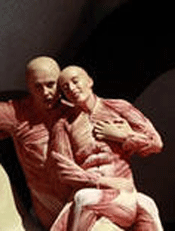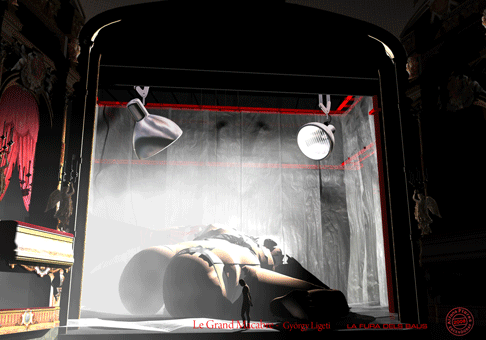
25 Jun 2009
Ligeti’s Le Grand Macabre shocks Rome but only mildly
Le Grand Macabre is the only opera of György Ligéti, one of the major composers of the 20th century.
English Touring Opera are delighted to announce a season of lyric monodramas to tour nationally from October to December. The season features music for solo singer and piano by Argento, Britten, Tippett and Shostakovich with a bold and inventive approach to making opera during social distancing.
This tenth of ten Live from London concerts was in fact a recorded live performance from California. It was no less enjoyable for that, and it was also uplifting to learn that this wasn’t in fact the ‘last’ LfL event that we will be able to enjoy, courtesy of VOCES8 and their fellow vocal ensembles (more below …).
Ever since Wigmore Hall announced their superb series of autumn concerts, all streamed live and available free of charge, I’d been looking forward to this song recital by Ian Bostridge and Imogen Cooper.
The Sixteen continues its exploration of Henry Purcell’s Welcome Songs for Charles II. As with Robert King’s pioneering Purcell series begun over thirty years ago for Hyperion, Harry Christophers is recording two Welcome Songs per disc.
Although Stile Antico’s programme article for their Live from London recital introduced their selection from the many treasures of the English Renaissance in the context of the theological debates and upheavals of the Tudor and Elizabethan years, their performance was more evocative of private chamber music than of public liturgy.
In February this year, Albanian soprano Ermonela Jaho made a highly lauded debut recital at Wigmore Hall - a concert which both celebrated Opera Rara’s 50th anniversary and honoured the career of the Italian soprano Rosina Storchio (1872-1945), the star of verismo who created the title roles in Leoncavallo’s La bohème and Zazà, Mascagni’s Lodoletta and Puccini’s Madama Butterfly.
Evidently, face masks don’t stifle appreciative “Bravo!”s. And, reducing audience numbers doesn’t lower the volume of such acclamations. For, the audience at Wigmore Hall gave soprano Elizabeth Llewellyn and pianist Simon Lepper a greatly deserved warm reception and hearty response following this lunchtime recital of late-Romantic song.
Collapsology. Or, perhaps we should use the French word ‘Collapsologie’ because this is a transdisciplinary idea pretty much advocated by a series of French theorists - and apparently, mostly French theorists. It in essence focuses on the imminent collapse of modern society and all its layers - a series of escalating crises on a global scale: environmental, economic, geopolitical, governmental; the list is extensive.
For this week’s Live from London vocal recital we moved from the home of VOCES8, St Anne and St Agnes in the City of London, to Kings Place, where The Sixteen - who have been associate artists at the venue for some time - presented a programme of music and words bound together by the theme of ‘reflection’.
'Such is your divine Disposation that both you excellently understand, and royally entertaine the Exercise of Musicke.’
Amongst an avalanche of new Mahler recordings appearing at the moment (Das Lied von der Erde seems to be the most favoured, with three) this 1991 Mahler Second from the 2nd Kassel MahlerFest is one of the more interesting releases.
‘And there was war in heaven: Michael and his angels fought against the dragon; and the dragon fought and his angels, And prevailed not; neither was their place found any more in heaven … that old serpent … Satan, which deceiveth the whole world: he was cast out into the earth, and his angels were cast out with him.’
If there is one myth, it seems believed by some people today, that probably needs shattering it is that post-war recordings or performances of Wagner operas were always of exceptional quality. This 1949 Hamburg Tristan und Isolde is one of those recordings - though quite who is to blame for its many problems takes quite some unearthing.
There was never any doubt that the fifth of the twelve Met Stars Live in Concert broadcasts was going to be a palpably intense and vivid event, as well as a musically stunning and theatrically enervating experience.
‘Love’ was the theme for this Live from London performance by Apollo5. Given the complexity and diversity of that human emotion, and Apollo5’s reputation for versatility and diverse repertoire, ranging from Renaissance choral music to jazz, from contemporary classical works to popular song, it was no surprise that their programme spanned 500 years and several musical styles.
The Academy of St Martin in the Fields have titled their autumn series of eight concerts - which are taking place at 5pm and 7.30pm on two Saturdays each month at their home venue in Trafalgar Square, and being filmed for streaming the following Thursday - ‘re:connect’.
The London Symphony Orchestra opened their Autumn 2020 season with a homage to Oliver Knussen, who died at the age of 66 in July 2018. The programme traced a national musical lineage through the twentieth century, from Britten to Knussen, on to Mark-Anthony Turnage, and entwining the LSO and Rattle too.
With the Live from London digital vocal festival entering the second half of the series, the festival’s host, VOCES8, returned to their home at St Annes and St Agnes in the City of London to present a sequence of ‘Choral Dances’ - vocal music inspired by dance, embracing diverse genres from the Renaissance madrigal to swing jazz.
Just a few unison string wriggles from the opening of Mozart’s overture to Le nozze di Figaro are enough to make any opera-lover perch on the edge of their seat, in excited anticipation of the drama in music to come, so there could be no other curtain-raiser for this Gala Concert at the Royal Opera House, the latest instalment from ‘their House’ to ‘our houses’.
"Before the ending of the day, creator of all things, we pray that, with your accustomed mercy, you may watch over us."

Le Grand Macabre is the only opera of György Ligéti, one of the major composers of the 20th century.
It is also one of the contemporary operas most frequently performed in Europe. Ligéti composed two different versions of Le Grand Macabre — the former had its debut in Stockholm in 1978, the latter in Salzburg in 1997. The main difference is that the second version replaces almost all the spoken parts with recitative. The production at the Teatro dell’Opera di Roma (June 18-23) is a world-wide affair. It started in Brussels a few months ago. From the Italian capital it will travel to Sidney, Australia. In the fall, it will have a long spell at the English National Opera in London and at the Liceu in Barcelona. It might go on to the US and other major European opera houses in 2010.
It is a grand, and very costly, production organized by the Catalan Group La Fura dels Baus , now very trendy — the Group has staged the entire Ring in Florence and Valencia; and it is booked by La Scala for a new production of Tannäuser, which will also be shown in Berlin and other major houses.
Le Grand Macabre reaches Rome with a reputation of scandal and even perversion. In January-February, the Brussels performances were well received by the audience but a few reviewers — including The New York Times — wrote about “debauchery” on stage. The new management of the Teatro dell’Opera advertised that the production is “for an adult audience”. At the opening nights, there were a few boos at some sexually explicit moments in the opera (in particular in the second scene of the first act) but the audience did not seem shocked. If it did, it was a very mild shock. Rome has been for centuries the Babylon of Europe and is accustomed to almost everything. There were several curtain calls, but (as it is often the case when a modern opera is on stage) a few rows and many boxes were empty.
Let us place Le Grand Macabre in its proper context. In his own comments to the second version of the opera, Ligéti said that he initially intended to compose a singspiel, but eventually he wrote a full opera because, among other things, it is difficult to find singers equally good at singing, acting and dancing. He also clarifies that, as a Hungarian, he was well-acquainted with operetta. Finally, his main operatic sources of inspiration were Monteverdi’s L’Incoronazione di Poppea and Verdi’s Falstaff. In short, even though Le Grand Macabre requires a huge orchestra and ten soloists, Ligéti thought of something light (the duration of the two acts is around 100 minutes) and very ironic. There are quotations from Verdi, Donizetti, Stravinsky, Mozart and, of course, Monteverdi in both the vocal and the orchestral score, which add irony to an otherwise late 20th century musical work (it is influenced by both the German Darmstadt School and the French ICRAM School. Along with numerous rhythmic orchestral passages, “declamation” slides easily into “arioso” and “duets”.

Irony also arises in the text. Based on a Belgian play, it is an allegory. In Bruegeland (a country based on Bruegel’s paintings), an asteroid is about to destroy every living thing on the planet. As the news breaks that death is near, the reaction of the populace is extreme sex (from the adolescent sex of a vigorous couple of teen agers to sadomasochistic sex of the Court’s astrologist and his wife). A few take up drinking, instead. The second part takes place in the corridors of power. As death arrives, intrigue and deception become pointless. Rather, it is better to join all in a crazy dance (a wild 15th century “ciaccona”). Mr. Death is expected to do all the killing and all the destroying, but finds more fun in joining the humanity in extreme sex and wild dancing . Thus, Bruegeland’s last day is postponed, perhaps forever.
In my opinion, La Fura dels Baus uses a very heavy hand in the stage production that clashes with Ligéti’s sophisticated and elegant score. The stage is dominated by a huge statue of woman in progressive decomposition where the characters come out from very private parts of her body. Irony does not seem to be a gift of the Catalan Group, even though, thanks to Ligéti’s music, it is manifest in the second part (especially in the “ciaccona”).
The orchestra responds extremely well to Zoltán Peskó’s conducting. Peskó is a compatriot and long-time friend of Ligéti. He is thus, fully equipped to show all the delicate nuances of the score. Chris Merritt has completed his transition from Bellini and Rossini coloratura belcanto to a high baritone for 20th century works. Brian Asawa is the best countertenor now available world-wide. Sir Willard White is as imposing as ever. Nicholas Isherwood is a master of early British music where it is quoted in the score. Caroline Stein is now a veteran of the double role a sensual Venus and a cynic Gepopo. Ning Liang is a vicious Nescalina. Annie Vavrille and Ilse Eerens are just delightful as the amorous teenagers.
Giuseppe Pennisi